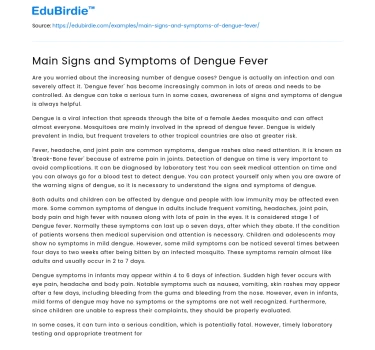Are you worried about the increasing number of dengue cases? Dengue is actually an infection and can severely affect it. 'Dengue fever' has become increasingly common in lots of areas and needs to be controlled. As dengue can take a serious turn in some cases, awareness of signs and symptoms of dengue is always helpful.
Dengue is a viral infection that spreads through the bite of a female Aedes mosquito and can affect almost everyone. Mosquitoes are mainly involved in the spread of dengue fever. Dengue is widely prevalent in India, but frequent travelers to other tropical countries are also at greater risk.
Save your time!
We can take care of your essay
- Proper editing and formatting
- Free revision, title page, and bibliography
- Flexible prices and money-back guarantee
Fever, headache, and joint pain are common symptoms, dengue rashes also need attention. It is known as 'Break-Bone fever' because of extreme pain in joints. Detection of dengue on time is very important to avoid complications. It can be diagnosed by laboratory test You can seek medical attention on time and you can always go for a blood test to detect dengue. You can protect yourself only when you are aware of the warning signs of dengue, so it is necessary to understand the signs and symptoms of dengue.
Both adults and children can be affected by dengue and people with low immunity may be affected even more. Some common symptoms of dengue in adults include frequent vomiting, headaches, joint pain, body pain and high fever with nausea along with lots of pain in the eyes. It is considered stage 1 of Dengue fever. Normally these symptoms can last up o seven days, after which they abate. If the condition of patients worsens then medical supervision and attention is necessary. Children and adolescents may show no symptoms in mild dengue. However, some mild symptoms can be noticed several times between four days to two weeks after being bitten by an infected mosquito. These symptoms remain almost like adults and usually occur in 2 to 7 days.
Dengue symptoms in infants may appear within 4 to 6 days of infection. Sudden high fever occurs with eye pain, headache and body pain. Notable symptoms such as nausea, vomiting, skin rashes may appear after a few days, including bleeding from the gums and bleeding from the nose. However, even in infants, mild forms of dengue may have no symptoms or the symptoms are not well recognized. Furthermore, since children are unable to express their complaints, they should be properly evaluated.
In some cases, it can turn into a serious condition, which is potentially fatal. However, timely laboratory testing and appropriate treatment for dengue can help control complications.






 Stuck on your essay?
Stuck on your essay?

